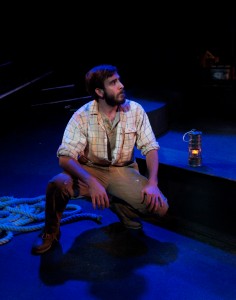Floyd Collins, Music and Lyrics by Adam Guettal, Book and Additional Lyrics by Tina Landau, Moonbox Productions, Boston Center for the Arts Plaza Theatre, 4/5/12-4/15/12, http://www.moonboxproductions.org/.
Reviewed by Craig Idlebrook
(Boston, MA) There are many ways to be trapped. For some thrill-seekers, the risk of death and the short life it might bring is a better alternative than dying incrementally in quiet desperation.
In Moonbox Productions’ staging of Floyd Collins, we meet an Appalachian adventurer who, driven by financial desperation and a desire to make his mark, becomes trapped while exploring a new cave. But while Floyd (Phil Tayler) slowly makes peace with his plight, his would-be-rescuers do most of the thrashing around as they try to embrace this moment in their lives. Saving Floyd from the cave becomes a national media spectacle, and it offers a way out of the monotony of eking out an existence in the Appalachian hills. But the spotlight also shines an uncomfortable glare on a way of life.
While this play is uneven and too long, rarely have I seen such a beautiful and haunting opening as Floyd’s first exploration in the cave. Tayler’s magnetic stage presence as Floyd captivates us from the first moment he walks onstage. With his slow movements and slower gaze, Tayler embodies the wiry desperation of a man willing to entrap himself underground in order for the promise of feeling free. The script gives less information about his motivations than of the motivations of any of the other characters, yet one can’t help but feel Collins’ wild thoughts seeping into our pores.
Tayler is aided by lighting that seem to bounce off the cave walls, bathing him in blue light, sickening him in white, and obscuring him in shadow. Lighting designer Jeffrey E. Salzberg’s lighting scheme combines with the haunting echoes of Appalachian yodeling to create a clammy and otherworldly experience.
But the play often loses steam when it goes above ground. It’s harder to make sense and feel a connection to the rescuers. Floyd’s neighbors and family are used to rescuing Floyd from scrapes, and they first are casual in their attempts. Later, when outsiders move in to help or to make a dollar off the rescue, the locals grow sullen and confused. Sympathy for the above-ground crowd leaks out like from a pinhole of a balloon. Too often, the action borders on melodrama, only to be rescued by Adam Guettel’s complicated and poignant musical score, which loops voice upon voice to create something more powerful than a mere choral effect.
Director Allison Choat approaches Appalachian culture by populating her play with over-the-top characters painted in broad strokes. While not every actor succeeds in this style and some descend into caricature, the directing choice makes for a vibrant play that carries the audience along through most of the above-ground action. Those of the cast who succeed seem to embrace Choat’s cue. Matthew Zahnzinger as Skeets Miller, a newspaper-reporter-turned-rescuer, creates a character that is so weird that he seems absolutely believable. Zahnzinger uses his body to create a loose-limbed and uncomfortable man who transcends the silliness and find his heart. Robert D. Murphy also does commendably as H.T. Carmichael, a drilling boss driven to create order in the rescue effort; Murphy’s manner and the costuming choice make the character look like a desperate version of Vince Lombardi.
Every actor seems to pick up the pulse of the production and lock in when he or she inches closer to Tayler’s Floyd, and the audience savors each moment of physical contact between Floyd and others as if it was our last embrace on earth.

